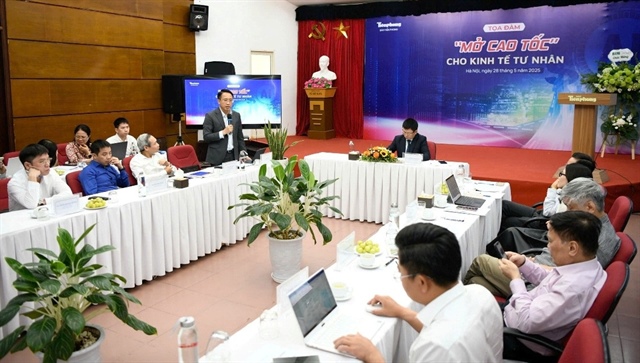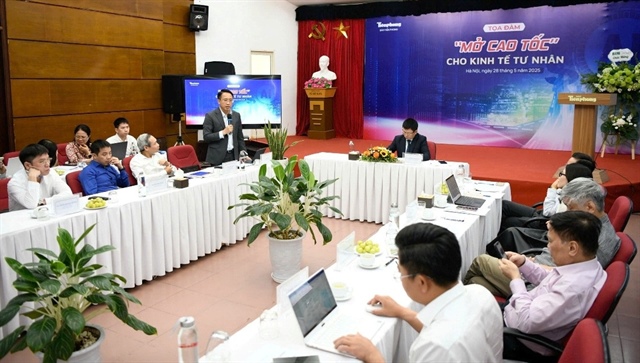Up to 60-70% of Administrative Procedures Can Be Eliminated
Speaking at the seminar ‘Opening the Expressway for the Private Sector’ held by Tien Phong newspaper on May 28, Ms. Bui Thu Thuy, Deputy Director of the Department of Private Enterprise and Collective Economy Development (Ministry of Finance), shared that many policies in Resolution 68 have been proposed during the past 20 years of policy research. However, they have not yet reached or benefited businesses.
According to Ms. Thuy, right after the adoption of Resolution 68, within just 11 days, the National Assembly issued Resolution 198 on special mechanisms and policies to develop the private sector. Within a week, the drafting committee also submitted two more resolutions to the government: Resolution 138 and Resolution 139, which clearly defined the responsibilities of relevant agencies.
Most of the concrete regulatory and institutional documents were issued in 2025, while some policies that required more mature research were scheduled for 2026. The draft government resolution set a clear timeline, so ministries, branches, and localities had to issue implementation plans in the second quarter of 2025.
“The policies in Resolution 68 are relatively clear. We expect that by June or July, the contents will be institutionalized and immediately implemented so that the resolution can soon become a reality,” said Ms. Thuy.
 Experts evaluate that Resolution 68 will create a historical turning point for the private sector. Photo: TP |
Mr. Nguyen Van Phuc, former Vice Chairman of the National Assembly’s Economic Committee, said that Resolution 68 has created a boost, motivation, and inspiration for the business community since its inception.
The Party’s viewpoint on not criminalizing economic and civil relations has been mentioned for a long time. The question is how to implement it? Decriminalization does not depend solely on the Party’s resolution but also on the Criminal Code, which the National Assembly is amending.
Since crimes and punishments are only defined in the Criminal Code, it is necessary to carefully review them during the amendment process. To limit criminalization, it is essential to reduce conditional business lines. By reducing just one conditional business line, numerous restrictive regulations or accompanying procedures can be eliminated,” Mr. Phuc stated.
Businesses Await Clear Legal Corridors
Mr. Phan Duc Hieu, a member of the National Assembly’s Economic Committee, said that fully implementing the spirit of Resolution 68 would create a historical turning point for the private sector.
The challenge lies in effectively implementing the resolution’s contents. Transforming the Party’s guidelines into institutional documents and putting them into practice is a complex process, even more difficult than making the resolution. Without institutionalization, the resolution will remain on paper.
Mr. Hieu emphasized that the National Assembly’s issuance of Resolution 198 was considered the first legal action to be implemented immediately, with the primary goal of contributing to overcoming the situation of policies awaiting legal amendments.
He believed that Resolution 198 offered minimal solutions, and the government and ministries could easily implement them. For instance, the resolution calls for the elimination of at least 30% of compliance costs in administrative procedures, but it does not prevent the government from abolishing them entirely or reducing them by 60-70%.
Ms. Nguyen Thu Thuy, Deputy General Director of BIM Group, in charge of the Project Development Department, shared that with Resolution 68, businesses are awaiting decrees and circulars to provide a clear mechanism and legal framework for smooth implementation in the coming time.
She appreciated the decentralization and delegation of authority from the government and ministries to local authorities and the reduction of administrative procedures for businesses in project implementation as positive signals, facilitating enterprises in executing their projects.
“Recently, the Prime Minister mentioned reducing approval procedures for investment permits. For housing projects, enterprises have to go through two steps: investment approval and then bidding or auctioning land. These procedures take a lot of time, averaging six months. Therefore, eliminating the investment approval procedure will enable enterprises to proceed with their projects.
Mr. Nguyen Kim Hung, Vice President of the Association of Small and Medium-sized Enterprises, Chairman of Kim Nam Group, suggested that, in addition to Resolution 68, a separate resolution or mechanism could be considered for small and medium-sized enterprises.
“If we are opening the expressway for the majority to enter, it should not only be for corporations and large enterprises but also for the community of small and medium-sized enterprises so that they can be protected and motivated to grow. We need to further concretize the resolution and mechanisms to transform 5 million household businesses into sustainable enterprises,” Mr. Hung expressed.
Nguyen Le
– 06:15 29/05/2025
“The Chairman of Hoa Phat Group Emphasizes on Prioritizing Domestic Production: A Mandate for Government Projects”
“Mr. Tran Dinh Long, Chairman of Hoa Phat Group, has proposed that all public investment projects, such as highways, should have a minimum of 70% domestic content. This bold suggestion highlights the potential for local manufacturing and the opportunity to reduce reliance on imports. With a strong belief in the capabilities of Vietnamese industries, Mr. Long envisions a future where local products take center stage in national development, paving the way for economic growth and a more resilient Vietnam.”
‘The Dark Side of Social Housing: How ‘Cò’ Profiteers are Distorting the Market’
“There is a persistent presence of brokers in the social housing sector, taking advantage of the high demand for such housing and creating a chaotic market with their resale practices. Mr. Nguyen Van Khoi, Chairman of the Vietnam Real Estate Association, highlights how these practices cause significant distress for legitimate buyers seeking social housing.”
A Southern Giant Eyes Northern Expansion with Land Acquisitions
“Vietnam’s leading real estate developer, Nam Long, has set its sights on expanding its reach to the northern market. With an ambitious vision, the company’s subsidiary, Nam Long ADC, is spearheading this endeavor by introducing an affordable housing project, marking their first venture into this region.”





















